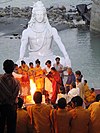Dharma
Dharma (/ˈdɑːrmə/;[7] Sanskrit: धर्म, romanized: dharma, pronounced [dʱɐrmɐ] (![]() listen) (Pali: dhamma) (Tamil: aṟam)) is a key concept with multiple meanings in Indian religions, such as Hinduism, Buddhism, Jainism, Sikhism and others.[8] There is no direct single-word translation for dharma in Western languages,[9] however, the Christian and Platonist concept of "eusebeia" is close to the Hindu interpretation of dharma, and the Christian or Stoic "Logos" is close to the Buddhist interpretation. The Christian notion of Physis, meaning "created order" or "the arrangement of physical reality", from which the modern word physics is derived, also overlaps with some readings of "dharma", albeit with a lesser emphasis on the divine. In addition, the New Testament usage of νόμος (nómos, literally "law") would often translate "dharma" well, as it is used both with reference to divine law (as in Heb 8:10[10]) and to the correct way for humans to live in accordance to divine law (as in Rom 9:31[11]).
listen) (Pali: dhamma) (Tamil: aṟam)) is a key concept with multiple meanings in Indian religions, such as Hinduism, Buddhism, Jainism, Sikhism and others.[8] There is no direct single-word translation for dharma in Western languages,[9] however, the Christian and Platonist concept of "eusebeia" is close to the Hindu interpretation of dharma, and the Christian or Stoic "Logos" is close to the Buddhist interpretation. The Christian notion of Physis, meaning "created order" or "the arrangement of physical reality", from which the modern word physics is derived, also overlaps with some readings of "dharma", albeit with a lesser emphasis on the divine. In addition, the New Testament usage of νόμος (nómos, literally "law") would often translate "dharma" well, as it is used both with reference to divine law (as in Heb 8:10[10]) and to the correct way for humans to live in accordance to divine law (as in Rom 9:31[11]).
In Hinduism, dharma is one of the four components of the Puruṣārtha, the aims of life, and signifies behaviours that are considered to be in accord with Ṛta, the order that makes life and universe possible.[12][note 1] It includes duties, rights, laws, conduct, virtues and "right way of living".[13] In Buddhism, dharma means "cosmic law and order",[12][14] as expressed by the teachings of the Buddha.[12][14] In Buddhist philosophy, dhamma/dharma is also the term for "phenomena".[15][note 2] Dharma in Jainism refers to the teachings of Tirthankara (Jina)[12] and the body of doctrine pertaining to the purification and moral transformation of human beings. For Sikhs, dharma means the path of righteousness and proper religious practice.[16]
The concept of dharma was already in use in the historical Vedic religion, and its meaning and conceptual scope has evolved over several millennia.[17] As with the other components of the Puruṣārtha, the concept of dharma is pan-Indian. The ancient Tamil moral text of Tirukkural is solely based on aṟam, the Tamil term for dharma.[18] The antonym of dharma is adharma.






